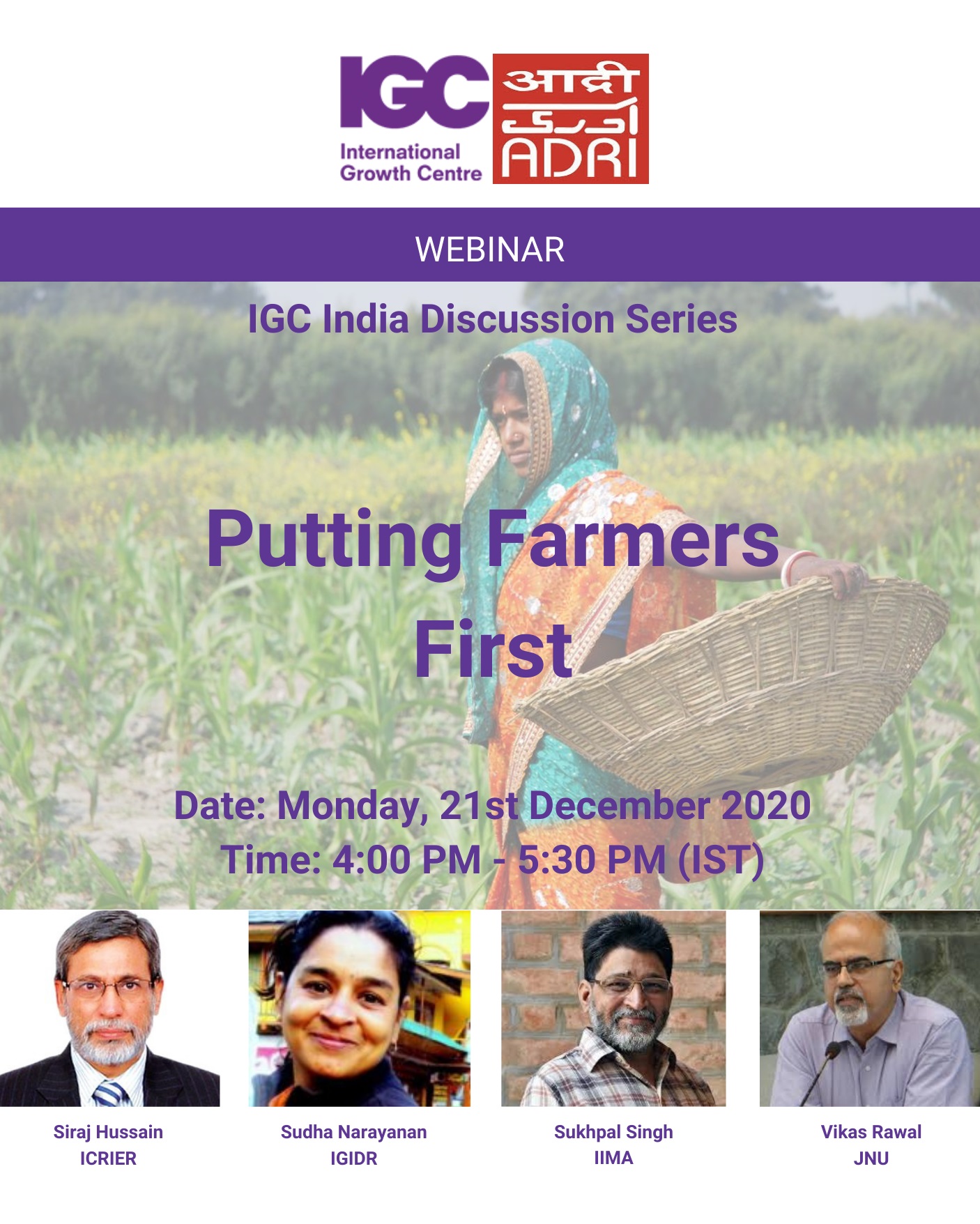Events of IGC

Title: Putting Farmers First
Panellists: Siraj Hussain (ICRIER), Sudha Narayanan (IGIDR), Sukhpal Singh (IIMA) and Vikas Rawal (JNU)
Date and Time: 21st December 2020 at 16.00 to 17.30 (IST)
Zoom Link for Registration: Registration Link
Brief: This year the pandemic has resulted in a wave of disruptions across people’s lives and their livelihood. And in recent times the focus on the agriculture sector in India has been of particular interest due to the impact of lockdown and the new agricultural reforms. There is a conundrum observed around the recent announcements of agriculture reforms with regard to the Agricultural Produce Market Committee (APMCs), framework for contract farming, revisions in Essential Commodities Act. The volatility of the agricultural markets is deeply contested in the economic and public policies across the Centre and State governments and raises concerns on accountability measures.
This necessitates the need to create a space to have the discussions to understand the structure and dynamics of agriculture markets along the lines of the new reform announcements and its impact on the lives and livelihood of the farmers. To stimulate thoughts on this important issue within the context of India, International Growth Centre (IGC) of London School of Economics (LSE) and Asian Development Research Institute (ADRI) will organise a Webinar on ‘Putting Farmers First’ on 21st December 2020 at 16:00 IST.
Patna, 21 December. The International Growth Centre (IGC) and Asian Development Research Institute (ADRI) organised a webinar titled, ‘Putting Farmers First’ on 21st December 2020. The panel was moderated by Suhkhpal Singh (Professor, IIMA). The event panellists were Siraj Hussain (Senior Visiting Fellow, ICRIER), Sudha Narayanan (Research Fellow, IFPRI), Vikas Rawal (Professor, JNU), and N Vijaya Lakshmi (Principal Secretary, Government of Bihar).
The pandemic this year has resulted in a wave of disruptions to people’s lives and livelihoods. In particular, it has created further challenges for Indian farmers as the Government of India announced three new agriculture reforms bills during the pandemic, because of which Indian agriculture has been in the national spotlight amidst the crisis. The volatility of agricultural markets is deeply contested in the economic and public policies across the central and state governments. In the on-going discussions there is a conundrum observed around the recent announcements of agriculture reforms with regard to the Agricultural Produce Market Committee (APMCs), framework for contract farming, revisions in Essential Commodities Act.
Siraj Hussain - Farmers are at the mercy of the market and volatility of the prices. The APMC system needed a rethink and bring more competition for better price realization. But APMC's efficiency across States vary & hence perceived impact of APMC has to be taken accordingly.
More than 50 private mandis have been setup in Maharashtra since the economic environment was better there whereas in Bihar, we had to float the tenders for 8 times since in Bihar the climate is not as attractive to private investors. There is reform needed but a consultative approach would be needed for the effectiveness of the act and in recent times the agrarian crisis and marketing reforms have got it mixed up.
Sudha Narayanan- The acts are more from the perspective of supply-chain actors & buyers less from producers, small and marginal farmers. There is a spatial inequality in terms of how buyers procure & depends on geographical areas i.e. sellers do not distribute themselves evenly. Mandi is a gendered space - what you hear from women centric organisations, women value the mandis as this is the trustable place to sell even if they don’t physically go there to sell. The Contract Farming Act will not make any change for the women Farmers - we need to consider the burden of work.
Vikas Rawal - A greater need is to increase investments and in market infrastructure and has been much discussed in the past. However, whether only these laws will be enough for increasing private investment is a concern and may not create greater competition but rather monopolise power.
N Vijaya Lakshmi - The diversification of crops is a complex issue but can be done; planning of agri growth as per the climate of the state & this can be a regular exercise where the researchers/policy makers can meet & discuss for 10 days before the farming cycle for next steps. On product diversification it is crucial to learn from Punjab where the water table has depleted a lot from growing similar food crops. It is important to communicate with farmers to motivate them to shift to other crops such as millets etc.
Sukhpal Singh - There are many critical aspects that we need to think about in terms of whether anyone can buy farm goods, whoever has a PAN card might be a bit risky. Further, 2003 APMC model act was better in terms of addressing grievance mechanism and counterparty risk assurance. And he emphasized that the current government is not putting the farmers first in the reform agenda.
Prabhat Ghosh gave the vote of thanks and stated that rather than repeal of the APMC act, we should reform APMC; rather than creating an alternative institution. We should address the prevailing challenges and vested interest which create raodblock for the APMC because the people who create problems in APMC will also create challenges in future for the new reforms as well. So, addressing the cause of the problem should be the focus of the Government.